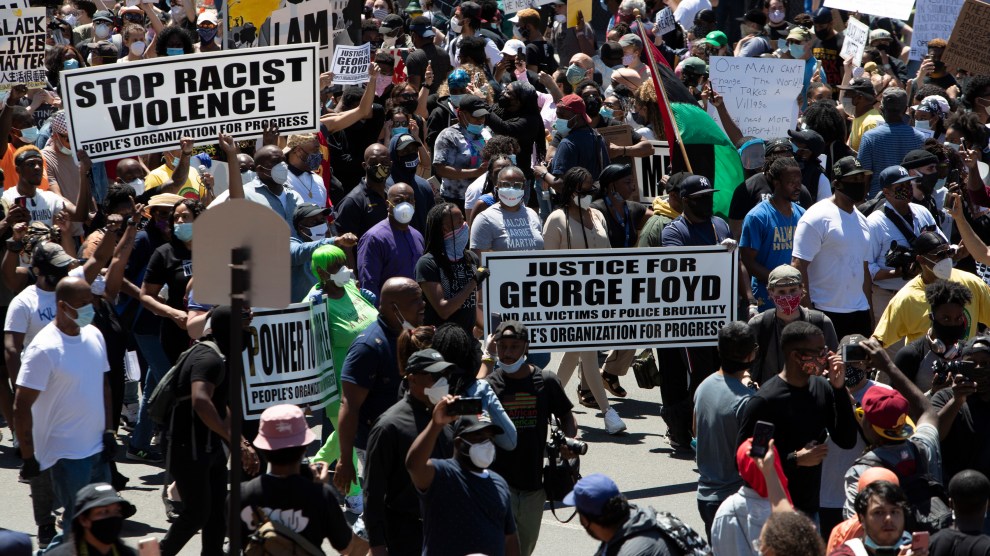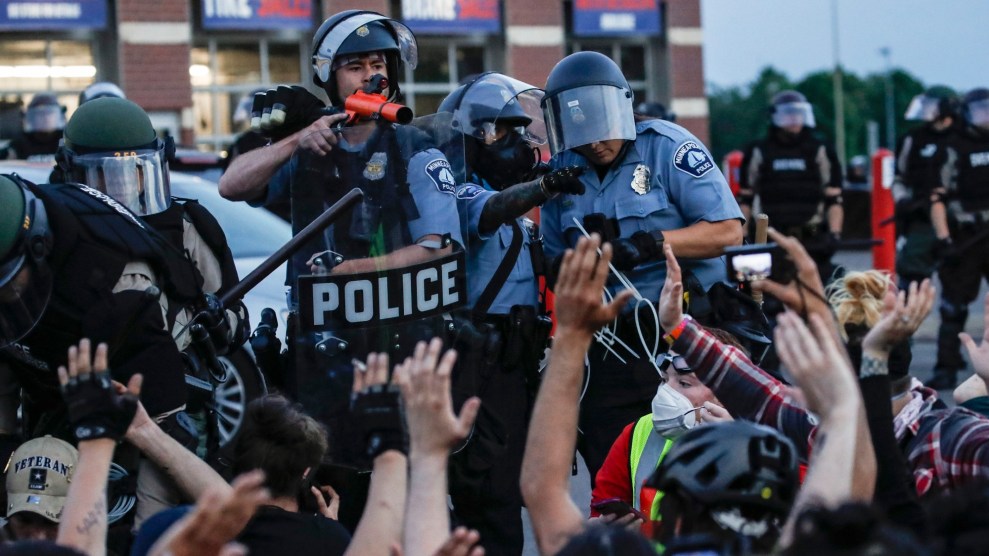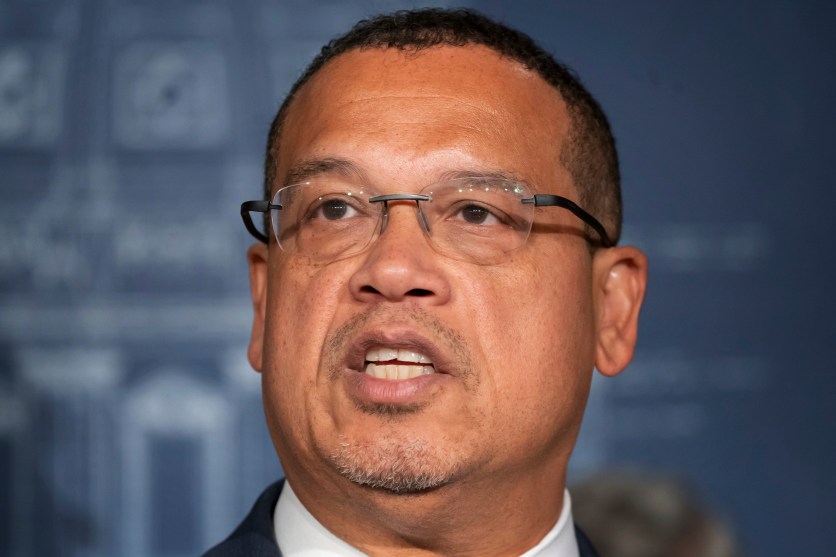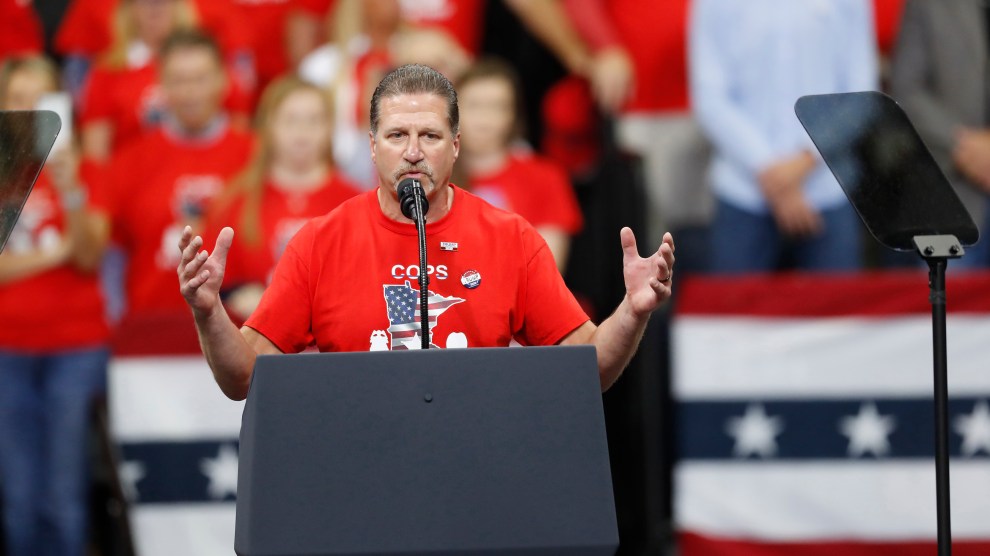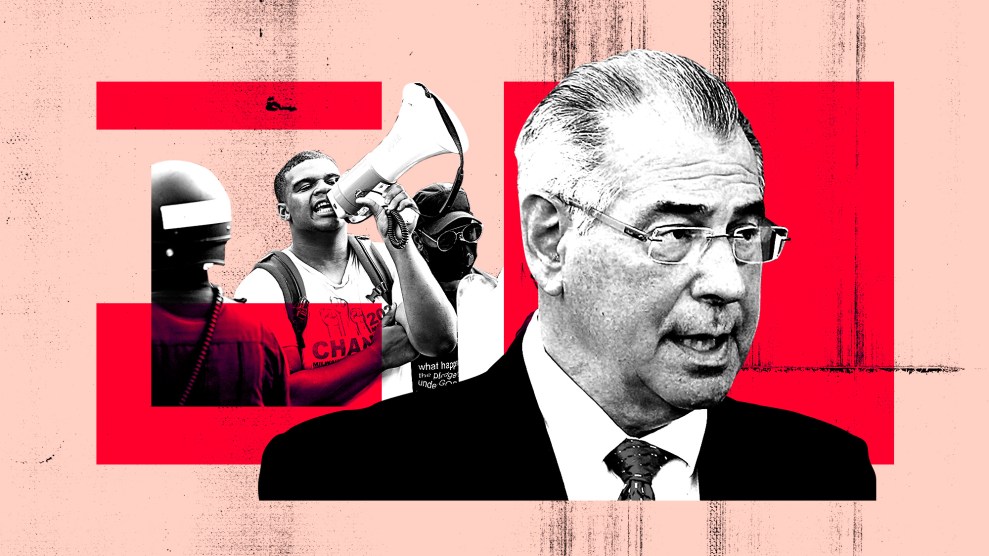
Mother Jones illustration; Jim Mone/AP; Morry Gash/AP
There are diverging accounts about what happened in the early morning hours of November 15, 2015 in Minneapolis. Police responded to an assault call and, officers say, there was a physical confrontation with the suspect, which ended with one of the cops shooting 24-year-old Jamar Clark. But according to witnesses, Clark was handcuffed and pinned to the ground when he was fatally shot in the head.
The police may dispute the eye-witness accounts—and video footage captured from the rear of the ambulance that was called to the scene only offers a vague glimpse of the shooting—but there is no disputing that Clark, an unarmed Black man, was killed by two white police officers. And Mike Freeman, the district attorney of Hennepin County—the same county in Minnesota where 46-year-old George Floyd was killed on Memorial Day this year when a white police officer put his knee on Floyd’s neck for 8 minutes and 46 seconds—declined to charge the two officers involved in Clark’s death.
Both Clark’s and Floyd’s tragic stories are all too familiar in Minneapolis, which has struggled with police violence for years. Despite a turnover of police leadership and adopted reforms, the problems with the Minneapolis Police Department persisted, and Floyd’s recent killing has shined an international spotlight on the issues that have long plagued the city. But for many local activists in Hennepin County (home to Minneapolis and its Western suburbs) the problem isn’t just the police—it’s Freeman, the longtime county prosecutor, who for years has declined to bring charges against cops for police-involved violence, especially cases that involve white officers and Black victims. It’s a pattern, activists argue, that has allowed the most abhorrent and racist behavior by cops in Hennepin County to essentially go unchecked. Now, in the aftermath of Floyd’s murder and Minneapolis’ reckoning with its police department, a dedicated group of activists are in the midst of a Herculean effort to recall Freeman as the Hennepin County DA.
The rationale for recalling Freeman, according to the activists behind the effort, is simple: “[He] has violated the constitutional rights of all Black residents of Hennepin County by denying them equal protection of law,” the recall effort’s website states. “White cops and Black residents know that Mike Freeman will protect cops who kill Black folks.” Though Freeman was initially leading the investigation into Floyd’s death, Minnesota Gov. Tim Walz asked state Attorney General Keith Ellison to assist Freeman’s office, later deciding that Ellison would take command of the prosecution, though Freeman has stayed on to assist the investigation as the co-prosecuting body. Given that Freeman’s office is still involved in the case and, given his tumultuous history with similar cases, activists think it’s paramount to have him removed from office as soon as possible.
Days after Floyd’s murder, Lena Gardner, a local activist in Minneapolis, got a call from her friend Kathleen Cole. Both women had been organizers in the protests that spawned in the wake of Clark’s murder in 2015; Gardner as core organizer in the original Black Lives Matter Minneapolis group and Cole as a founding organizer for Showing Up for Racial Justice-Twin Cities. Through their years of local activist work, they were quite familiar with Freeman’s reputation and knew that he’d be involved in prosecuting the four cops responsible for Floyd’s death. Given this, they thought it was tantamount that Freeman be removed from office. When they started collecting signatures, they were surprised to learn that a lot of people didn’t really know what the Hennepin County attorney does, nor how much power that person has over holding police accountable. “But once they found out how much Mike Freeman has dropped the ball in police accountability cases, people would tell us ‘yeah, it’s probably time for us to recall him,'” Gardner says.
Gardner and Cole then linked up with another local organizer they knew, Jared Mollenkof, a public defender who sits on the board of the Minneapolis Freedom Fund, the local bail fund that exploded into public view in the wake of the George Floyd protests, raising more than $30 million in a matter of weeks. From there, the three of them started to recruit the other members that now make up core team for the recall campaign—some they knew from their work in electoral politics but mostly through their backgrounds in grassroots organizing. Eight days after Floyd’s murder on May 25, the campaign to recall Freeman officially kicked off.
Freeman’s long tenure as the Hennepin County attorney began in 1991, after he had served for nearly a decade in the state Senate. He held the position—a particularly powerful role that represents nearly a quarter of the state—until 1999, after he mounted an unsuccessful gubernatorial run. In his place, Freeman threw the full weight of his support behind then-political novice Amy Klobuchar, who had long supported his career as the Hennepin County DA. When Klobuchar decided to run for the US Senate in 2005, she returned the favor, backing Freeman in the 2006 election for his old position, which he won by a wide margin.
Freeman has comfortably held his position ever since, garnering a reputation for being tough-on-crime and particularly chummy with the Minneapolis Police Department, especially when it came to instances of police violence. Most troubling, though, is his reputation when it comes to racial profiling and prosecuting people of color in Hennepin County.
In 2016, Black residents made up only 6 percent of the state’s population, but nearly 37 percent of the state’s prison population. And according to court data compiled by the Minneapolis Star Tribune in 2017, since he took office Freeman has charged Black residents in Hennepin County with 44 percent of all felonies, despite that Black residents only make up 12 percent of the county’s population. More recently, data obtained by the New York Times found that more than 60 percent of the victims of police shootings in Minneapolis in the past decade were Black residents, who account for only 20 percent of the city’s population.
Though Freeman, as county attorney, is not in charge of the Minneapolis Police Department, his office is tasked with prosecuting officers involved in police shootings and the decision of whether or not to charge any officer involved in a shooting lies solely with him. Likewise, Freeman’s position gives him the chief authority to prosecute those facing felony charges, and the racial disparity in Hennepin County’s prosecution rate is a direct reflection of what cases are brought by Freeman’s office.
It’s no easy feat to recall an elected official in Hennepin County, and the campaign says that it has never been attempted before. For starters, the requisite number of signatures required to kickstart the recall process is 126,522, roughly 10 percent of the total county population and they must be signed in person—no small task on its own, but even tougher in the midst of a global pandemic. At the beginning of the Floyd protests in and around Minneapolis, Gardener says the campaign took advantage of the moment to start collecting signatures. “We would get 800, 1,000 signatures at a time at protests,” she says. “But as those have dissipated we’ve been switching to a ground game.” That’s taken the form of traditional grassroots political efforts, with volunteers stationed at high traffic areas—like grocery store parking lots, community centers, and shopping centers—to collect signatures, as well as phone banking. Still, the group is taking advantage of any opportunity they can to gather signatures, including at the Minneapolis Children’s March on Saturday.
In mid-June, the campaign formally registered as a 501(c)4 in order to fundraise for its signature-gathering efforts. They raised $10,000 to purchase access to a Voter Activation Network, a voter database often used by electoral campaigns to identify and target registered voters. Cole says that they’re working on an education project to help local voters understand the role that the county attorney’s office plays in mass incarceration in the state. By the third week of August, they have gathered more than 20,000 signatures. They still have a long way to go to reach the requisite number of signatures to trigger the recall process, but it’s not an impossible task. And the money and resources that the group is pouring into their ground game is, at the very least, generating fresh engagement from Hennepin County residents. “I think now there’s a lot more people paying attention and trying to figure out how to save Black lives and do policing and the whole criminal justice system differently,” Gardner says. “And they’re finally starting to listen to organizers who have been saying things for decades.”
Gardner points to a number of cases similar to Clark as part of a disturbing pattern. There’s the case of Wayne Reyes, who in 2006 was suspected of stabbing his girlfriend and friend in a domestic dispute. When police pulled him over, they said that he stepped out of the vehicle and pulled out a shotgun. And so six officers fired 43 rounds at him in four seconds, killing him. But according to Reyes’ daughter, the blurry dashcam footage from one of the responding officer’s cars that captured the incident does not show Reyes outside of his vehicle until after he was shot. One of those six officers who shot Reyes was Derek Chauvin, the officer who killed Floyd when he put his knee on his neck for nearly nine minutes. Instead of charging the officers, Freeman sent the case to a grand jury who decided not to bring charges.
In 2018, Freeman declined to charge two police officers who shot and killed 31-year-old Thurman Blevins after chasing him through an alleyway in a Minneapolis neighborhood. According to body-worn camera footage of the incident that was released, some of Blevins’ last words were, “Please don’t shoot me.” And in February of this year, Freeman’s office did not bring charges against five police officers who fatally shot 30-year-old Brian Quinones-Rosario, who livestreamed himself being chased by police in his vehicle before getting out and threatening the officers with a knife.
In one of the few instances where Freeman did bring charges against a police officer, it was against a Somali-American cop, Mohamed Noor who fatally shot Justine Damond, a white woman from Australia when she snuck up on Noor and his partner while they were parked in an alley at night. Noor was initially charged with second-degree manslaughter and third-degree murder, but Freeman’s office later added the charge of second-degree murder. He was acquitted of the latter charge, but convicted of third-degree murder and manslaughter.
“It’s alarming how racialized Freeman’s prosecuting is,” says Gardner. “When it’s a white victim and a Black cop or a Somali cop, he is hyper ready to pursue action. But when it’s a white cop and a Black or Indigenous victim, he will rarely bring charges. And that’s why he needs to go.”
A spokesperson for the Hennepin County attorney told Mother Jones that the office “disagrees with the campaign’s opinion of County Attorney Freeman,” but declined to provide any further comment.
The effort to recall Freeman appears to have an unlikely ally to help make the case: The lawyers representing J. Alexander Kueng, one of the cops charged as an accomplice in Floyd’s killing. Earlier this month, one of Kueng’s lawyers, Thomas Plunkett, filed a motion to have Freeman removed from the case, arguing that he has become too close to law enforcement to ethically prosecute the case. In his motion, Plunkett argued that, in public statements, Freeman has already proclaimed Chauvin, Kueng, and the other two officer’s guilty. “Mr. Freeman has called the death of Mr. Floyd a ‘senseless death’ and [said] that he is sympathetic to the Floyd family,” he wrote. Elsewhere in the motion Plunkett filed, he argued that Freeman is in a position of inherent conflict because of the history of law enforcement and prosecutors working together in order to bring about convictions. “Mr. Freeman is unique as he fits snugly in both the ‘white washer’ category and ‘overzealous scapegoated’ category,” Plunkett said.
This isn’t the first time that there’s been talk of launching a campaign to recall Freeman. In 2019, shortly after he won his last reelection and a week after he announced the conviction of Noor, Freeman appeared at a crime prevention meeting in north Minneapolis where multiple sources reported his erratic behavior. According to the Star Tribune, Freeman was speaking at a meeting for a street violence and gang intervention program where he “struck a boastful tone” as he told the audience—which included gang members, police officers, lawyers, and other residents—that he “wasn’t afraid to charge anyone,” including police officers. Later in the evening, Freeman allegedly slapped the body of police car and told nearby officers, “Thanks for not shooting me,” which was interpreted by those officers as an off-color reference to the Noor case. A week later, Freeman announced he was taking a leave of absence to enter an alcohol treatment program. After that incident, Cole says that there was talk in local activist circles of trying to mount a campaign to recall him, but that it didn’t ever amount to anything more than a private Facebook group.
Even if the recall effort isn’t successful, its organizers recognize that it’s an opportunity to start laying the groundwork to support a progressive candidate to take on Freeman in 2022, when he’s next up for reelection. In the 2018 election, Mark Haase, a progressive upstart attorney who co-founded the Minnesota Second Chance Coalition, a non-profit advocacy group that fights to restore full rights to formerly incarcerated residents, ran against Freeman, hoping to ride the crest of newly elected progressive DAs, like Larry Krasner in Philadelphia, Chesa Boudin in San Francisco, and Wesley Bell in St. Louis. Haase lost that election by nearly 10 percent. Gardner thinks that was because Hennepin County voters just didn’t know enough about the role that prosecutors have in the criminal justice system. “Even as we defund the police, we also have to radically transform the county attorney’s office if we’re going to have meaningful change toward decarcerating Minnesota,” Cole adds.
But if the recall effort does get enough signatures and gets as far as a public hearing, Gardner thinks that they have more than enough evidence to prove that Freeman should be removed from office. “I feel like we really can’t wait because the cops are probably going to kill another person and that person is probably going to be Black,” she says. “I just don’t feel like he’s going to bring justice because he’s shown that he doesn’t believe in justice for Black people, really, when it comes down to it.”

